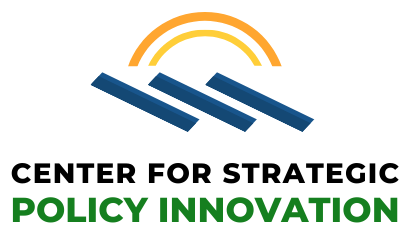Kevin Daehnke, Founder and Chair of the Board
Kevin Daehnke is Founder and President of the Center for Strategic Policy Innovation. He is also an environmental lawyer, first at large law firms in the Los Angeles area, and then for more than 25 years at Daehnke Cruz Law Group, a law firm he founded.
During college, at Arizona State University, Mr. Daehnke did his Honors Thesis on The Economies of Scale in Energy Research and Development. Later, in law school at the University of Southern California (USC), Kevin co-founded the USC Journal of Law and the Environment, served as the Journal’s first Editor-in-Chief, and wrote a law school dissertation on “The Legal Implications of Ocean Energy Farms”. After law school, Mr. Daehnke focused his early efforts as an attorney on cleaning up old contaminated sites, which led him to become one of the pioneers in the “Brownfields” movement that began in the 1990s. While serving on various panels and committees, authoring several published articles, and speaking at conferences and events across the country, Kevin also assisted in the development of key federal and California state initiatives, including in particular California Senate Bill 989 (SB 989, discussed below), designed to clean up old contaminated Brownfield sites, and make them productive again.
In the late 1990s Kevin founded and served as President of the Center for Year 2000 Community Action Plans (CYTCAP), a national think-tank that focused on protecting critical local infrastructure from the potentially catastrophic impacts of multi-day electric power grid failures. As part of that effort he co-authored and developed an infrastructure business continuity preparedness handbook entitled “Business Continuity Planning for Local Infrastructures,” endorsed by the National League of Cities, National Association of Counties and the ICMA. The CYTCAP think-tank also produced a 30-minute local government training film based on the handbook, which was distributed to more than 1,000 public T.V. stations nationwide.
Mr. Daehnke is credited for the creation and legislative passage of California Senate Bill 989, which became law in 2008, that pioneered the Bona Fide Ground Tenant tool to revitalize landfills and other Brownfield sites for renewable energy and other productive uses. As an adjunct to this California effort, Kevin has served in an advisory capacity to the U.S. EPA, the United States Attorney’s office and the California Department of Toxic Substances Control in their efforts to encourage the siting of renewable energy facilities at old landfills and other contaminated sites.
In 2018, Mr. Daehnke founded the Center for Strategic Policy Innovation (the “Center” or “CSPI”), a 501(c)(3) nonprofit corporate entity, and created the Clean Growth Incubator, a collaborative nationwide effort designed to kick-start significant economic development by helping to infuse capital for clean, renewable energy and smart grid projects into impacted communities across America. As an adjunct to the buildout of shovel-ready clean energy and smart grid infrastructure using the urban-planning and business incubation techniques set forth in the Clean Growth Incubator Platform, Kevin, the Center, and its strategic partners are involved presently with the direct visioning, modeling and buildout of solar PV energy-anchored “microgrids,” designed to operate independently of the energy grid in the event of a power outage. This model for resilient local solar energy microgrids combines the vision of clean renewable energy with the urgent need to protect critical local infrastructure facilities - like hospitals, wastewater treatment plants and community resiliency centers - from the threat of long-term electric power outages due to catastrophic storms, floods, wildfires, earthquakes, electromagnetic pulse (EMP) events, and cyber attacks.
The private sector, social-impact business model Kevin has developed for building out clean energy microgrids and other clean energy/resilient infrastructure projects has received support from the national Council of Development Finance Agencies (CDFA), from the California Association for Local Economic Development (CALED) and from the Environmental Justice community. Kevin has showcased the model at CDFA’s 2019 Federal Policy Conference in Washington D.C., at the Brownfields 2019 conference in Los Angeles, at the Milken Institute’s annual 2020 California Policy Summit, and at the Milken Institute’s June 15, 2020 “Leveraging Capital to Build Resilient Local Economies” webinar.
In 2021, CSPI teamed up with Arizona State University’s Laboratory for Energy And Power Solutions (LEAPS) and with the Department of Energy’s National Renewable Energy Laboratory (NREL) to conduct a Pilot Project in Lansing Michigan, with the purpose of demonstrating how best to utilize the publicly available clean energy modeling tools (developed by NREL) known as the Renewable Energy Optimization Tool (REopt) and the System Advisor Model (SAM) to benefit underserved, disadvantaged communities. CSPI has taken its strategy for building local solar energy-anchored microgrids and the the best practices/lessons learned from the Lansing Pilot project and, in May of 2023, once again teaming with ASU and NREL, conducted its first (24 hours of instruction) nationwide real-time (online) training, using NREL’s SAM and REopt modeling tools as the backdrop for the course. Based on the great success of this training effort, in early 2024 CSPI launched its One Thousand Resilient Communities training initiative, a nationwide outreach designed to train one thousand local champions across the country in just 18 months. This initiative will teach representatives of cities, counties, tribal lands and communities across the country how to seek out, identify, vision and model (both technically and financially) solar PV-anchored battery storage/microgrid projects to benefit underserved, impacted communities everywhere.
Kevin Daehnke believes that a massive buildout of a locally-based “distributed energy” model that relies on clean renewable sources of energy, and provides energy resiliency through the buildout of thousands of locally-based clean energy microgrids in disadvantaged communities, will launch the U.S. into its next industrial revolution. He firmly believes that this exciting time will result in a crowd-based economy here in the U.S. and worldwide that will utilize our natural resources much more efficiently and provide for millions of new entrepreneurial opportunities here in the U.S. alone.


